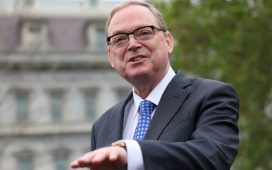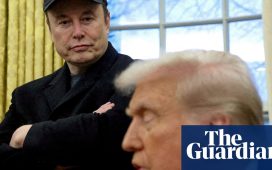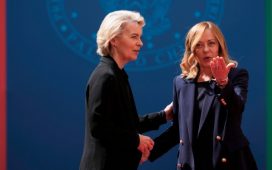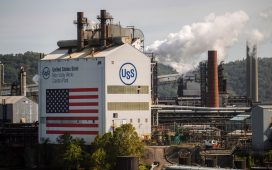The Federal Reserve kept interest rates on hold and called out growing dangers in the US economy amid Donald Trump’s erratic rollout of an aggressive trade strategy.
Jerome Powell, the US central bank’s chair, cautioned that the president’s tariffs were likely to raise prices, weaken growth and increase unemployment if maintained.
Fed policymakers cautioned that “the risks of higher unemployment and higher inflation have risen” as they opted to maintain the benchmark interest rate for the third time in a row. “Uncertainty about the economic outlook has increased further,” they said in a statement.
With inflation expectations – how consumers think prices will move – rising,Powell, the Fed chair, said the “driving factor” appeared to be Trump’s tariffs.
At a press conference, he said: “If the large increases in tariffs that have been announced are sustained, they are likely to generate a rise in inflation, a slowdown in economic growth, and an increase in unemployment.”
The US president has repeatedly demanded in recent months that the Fed cuts rates – and even raised the prospect of firing Powell, before walking back the comments – as Trump’s tariffs plan appeared to knock the US economy.
The Fed has been sitting on its hands for months, however, citing heightened uncertainty. It last cut rates in December, to a range of between 4.25% and 4.5%.
As Trump pushed ahead last month with sweeping tariffs on imported goods from much of the world, Powell cautioned this would probably raise prices and slow growth – despite the administration’s pledges to revitalize the US economy and reduce the cost of living for millions of Americans.
US gross domestic product (GDP) shrank for the first time in three years during the first quarter, raising fears of recession as Trump’s tariffs – and threats of tariffs – cast a shadow over the world’s largest economy.
Asked whether he was trying to take responsibility for stronger parts of the economy, while blaming his predecessor, Joe Biden, for any sign of weakness, Trump told NBC’s Meet The Press: “I think the good parts are the Trump economy, and the bad parts are the Biden economy. Because he’s done a terrible job.”
After Fed policymakers finished their latest two-day meeting on Wednesday, the central bank reiterated in its statement that they would “carefully assess incoming data, the evolving outlook, and the balance of risks” ahead of future meetings.
Its callout of greater risks in the US economy amounted to “a thinly veiled critique of the new administration’s import tariffs”, said Samuel Tombs, chief US economist at Pantheon Macroeconomics, “and represents an assertion of independence”.
Addressing reporters after the meeting, Powell said he could not provide a timeframe for rate cuts. “We are going to need to see how this evolves,” he said. “There are cases in which it would be appropriate for us to cut rates this year. There are cases in which it wouldn’t. And we just don’t know.”
While concern over the economic outlook is mounting, Powell stressed there had been no “big economic effects” in the data so far. “People, they are worried now about inflation, they are worried about a shock from the tariffs,” he said. “But they really haven’t – that shock hasn’t hit yet.”
Asked how Trump’s demand for rate cuts affected the Fed’s latest decision, and the difficulty of his job, Powell responded bluntly. “Doesn’t affect doing our job at all,” he said.
He reserved perhaps his briefest response for when a reporter asked what he thought when Trump said last month he had “no intention” of firing him – days after saying his termination could not come fast enough. “I don’t have anything more for you on that,” said Powell.









